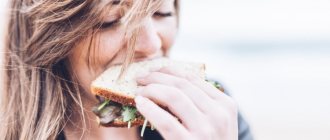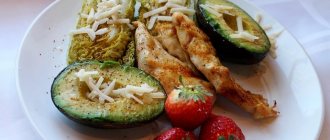Appetite was designed by nature as a safety mechanism - so that we do not die of hunger. The desire to eat is a signal that the body needs to replenish energy reserves.
A whole complex of processes is responsible for the sensations of hunger and satiety in our body, for example, the production of a number of hormones, changes in blood sugar levels, etc. The emotional background also matters. Mild excitement stimulates appetite, and moments of strong nervous tension can completely discourage the desire to eat. You need to be able to distinguish physiological hunger from emotional hunger. The latter often leads to excess weight gain. And living when you constantly want to eat becomes not very comfortable.
Increased appetite can have various reasons. But most often we are drawn to the refrigerator when the diet is poorly balanced, the diet and daily routine are not adjusted. We live in conditions of constant stress and do not know how to cope with it. How to reduce your appetite if you are constantly hungry? Let's talk.
How to reduce appetite with food
Blood sugar levels remain normal when there is enough chromium in the body - the feeling of hunger is reduced. Sources of chromium include wholemeal wheat flour, wheat germ, brewer's yeast, liver, black pepper, lemon balm, and cheese.
Instead of confectionery, which constantly adds fat, sugar and extra calories to us, eat fruits, and. They contain fructose - it successfully replaces sweets and reduces hunger, and there are much fewer calories than in any usual dessert.
Ordinary clean water reduces appetite well. It is better to drink mineral water, but not carbonated water. Of course, you need to drink 20-30 minutes before meals; You should not drink after meals - this slows down digestion, as gastric juice is washed away.
Diet is one of the surest ways to lose weight. Unfortunately, not every person can overcome the oppressive feeling of hunger and overcome themselves in the struggle for a slim figure. What to eat so you don't want to eat? Perhaps the answer to this question can help keep the body in strict control and achieve the desired results.
Considering the glycemic index
Products that resist appetite can be different - vegetables, fish, fruits, and dairy products. They have one thing in common: a low glycemic index. A study by British scientists from Cambridge states that white bread, many cereals and sweets have a high glycemic index, while fruits, most vegetables and dairy products have a low glycemic index. They increase the production of hormones that suppress appetite and send a signal that the body is full.
This was confirmed by the results of a study in which participants ate low-GI foods for breakfast and as a result had 20% higher plasma GLP-1 levels and 38% lower insulin levels compared to those who ate high-GI foods. Note that this is the first study in which experts were able to clearly illustrate the effect of low GI food on the production of GLP-1 and satiety in the body.
Blood sugar levels remain normal when there is enough chromium in the body - the feeling of hunger is reduced. Sources of chromium include wholemeal wheat flour, wheat germ, brewer's yeast, liver, black pepper, lemon balm, and cheese.
| Carbohydrates with a high glycemic index (“bad” carbohydrates) | Carbohydrates with a low glycemic index (“good” carbohydrates) | ||
| fried potatoes | 95 | bran bread | 50 |
| mashed potatoes | 90 | unprocessed rice grains | 50 |
| honey | 90 | peas | 50 |
| carrot | 85 | unprocessed grains without sugar | 50 |
| cornflakes | 85 | cereals | 40 |
| sugar | 75 | buckwheat | 40 |
| white bread made from premium flour | 95 | rye bread with bran | 40 |
| refined cereals with sugar (muesli) | 70 | fresh fruit juice without sugar | 40 |
| chocolate | 70 | wholemeal pasta | 40 |
| boiled potatoes | 70 | Red beans | 40 |
| biscuits | 70 | dry peas | 35 |
| corn (maize) | 70 | dairy | 35 |
| White rice | 70 | lentils | 30 |
| black bread | 65 | wholemeal pasta | 30 |
| beet | 65 | chickpeas | 30 |
| bananas | 60 | fresh fruits | 30 |
| jam | 55 | canned fruit (no sugar) | 25 |
| dough made from flour without bran | 55 | dark chocolate (with cocoa content more than 60%) | 22 |
| fructose | 20 | ||
| soybeans | 15 | ||
| green vegetables, tomatoes, lemon, mushrooms | less than 15 | ||
Recipes for main meals
It is recommended to eat porridge for breakfast, and dishes rich in protein for lunch; they are very nutritious and extremely healthy. It can be lean meat or fish, eggs, any low-fat dairy products. You should not load only one meal with protein as much as possible; divide the daily intake of this substance into lunch and dinner. What should you eat so that you don’t want to eat for 4 hours? A likely answer would be soup made with vegetable, lean broth. The liquid foundation is extremely nutritious and contains minimal calories.
Snack Recipes
Fresh vegetables and herbs are ideal for light snacks. On average, 100 grams of regular leaf lettuce contains only about 30 calories - and that's very little. Also useful are cucumbers and cabbage, as well as root vegetables such as carrots or beets. All of them are extremely rich in fiber, which can increase in volume in the stomach, creating a false feeling of fullness. In addition, it takes quite a long time to digest, causing our brain and stomach to suppress the feeling of hunger. If you are tired of raw vegetables, try to diversify your menu by stewing them.
Snacks can also be based on healthy proteins. A small amount of cottage cheese, natural yogurt or one egg will be a good solution for satisfying hunger during a diet.
The question of what to eat so as not to want to eat all day is not asked by people with normal metabolism. The process of food absorption is regulated in our body by the thyroid gland. For its proper functioning, it is recommended to include something iodine-containing in the menu. For example, all kinds of seafood: fish, squid and shrimp, as well as kelp seaweed. In addition, pears, onions and special salt enriched with iodine will be very useful.
Adjust your diet and organize your diet
How to curb your appetite to lose weight? To curb the desire to eat, it is often enough to reconsider your diet. Your task is to get rid of bad eating habits and form good ones.
Let me remind you that the menu should be formed on the basis of a variety of cereals (cereals, whole grain bread), vegetables and herbs, low-fat (up to 2.5%) dairy and fermented milk products (cottage cheese, kefir, cheeses), protein products (meat and fish, seafood, poultry, rabbit), as well as fruit. Such a balanced diet will provide your body with proteins, fats, carbohydrates, vitamins, minerals and fiber. By getting everything you need, you will not be subject to bouts of hunger, and it will become easier to refuse attractive but unhealthy food. Drink enough fluid - 1.5-2 liters per day. The bulk of this volume should be ordinary water. If you regularly use it between meals, you will want to eat less - we often mistake thirst for hunger.
Don't starve
Your appetite may increase for a trivial reason: you really are hungry all the time. You try to eat less and curb your appetite. Your diet is too poor and your body lacks energy. It is not difficult to verify this assumption. Try increasing the amount of food you eat for a few days. You can introduce, for example, additional snacks or eat more at main meals. Monitor your feelings: are you still tormented by hunger pangs? If you feel satisfied with food, it means you were clearly malnourished before.
Don't give up carbs
Those who are overweight in the hope of losing weight tend to exclude carbohydrates from their menu. And not only fast ones (sweets, baked goods), but also slow ones (porridge, pasta, whole grain bread, etc.). Such radical measures will not help you become slimmer, but will lead to you being constantly hungry. We remind you: carbohydrates are fuel for our body and it is necessary for it. The result of a carbohydrate deficiency in the diet will not only be a brutal appetite. If the diet does not provide enough carbohydrates, the body begins to draw energy from other sources, primarily from muscle tissue, destroying it.
Giving up carbohydrate foods is the wrong strategy. Your menu may also include a small amount of simple carbohydrates. This is important from a psychological point of view. Subconsciously, we negatively perceive any restrictions and strive to generously reward ourselves during the period of deprivation. A little chocolate or a glass of fresh juice will help you quickly restore strength after intense physical activity, as well as in a situation where you urgently need a portion of additional energy. Fast carbohydrates can exacerbate hunger, causing spikes in blood sugar. You can avoid this by eating sweets along with a small portion of protein or plant fiber - they will slow down the absorption of glucose.
About the most important thing_ Causes of constant hunger
Eat enough protein
Lack of protein in the diet is another common cause of increased appetite. Proteins are the building material for the muscles and tissues of the body, and since they are absorbed much more slowly than carbohydrates, they give us a feeling of fullness for a longer period.
Vegetarians often lack protein. But not only. The amount of protein food in the diet is reduced by those who count calories: sources of animal protein, as a rule, also contain fat. It is likely that you begin to feel hungry within an hour after eating due to the fact that there is little protein in your menu. The ideal option for breakfast and lunch is a portion of protein combined with slow carbohydrates, which can charge you with energy for a long time.
Avoid junk food
Reduce fast food, chips, all kinds of candy bars and sweet carbonated drinks, packaged and reconstituted juices, ready-made compotes and fruit drinks to a minimum in your diet. These products are high in calories, but at the same time they do not satiate, but only whet the appetite more. After a glass of sweet juice, your blood glucose level rises sharply, and then drops just as quickly, and you have a strong desire to eat something again.
Eat regularly
Try not to skip meals. Frequent bouts of hunger may be a sign that you eat erratically and do not adhere to a clear regimen. In a hurry or in the hope of losing weight faster, you refuse breakfast or lunch, grab something on the go, “take bites” instead of eating normally. The body suffers and lets you know that you have problems by whetting your appetite.
Try to eat regularly throughout the day. Breaks between meals should not exceed three hours. By strictly following this plan, within a week you will notice that you no longer want to chew something incessantly.
Healthy pampering
Quite often, the cause of overeating and frequent snacking is stress and a nervous environment. Therefore, when thinking about what to eat so that you don’t want to eat, you shouldn’t forget about sweet foods. A separate category of edibles stimulates the production of a unique hormone, the presence of which in the body is responsible for the good mood of any person. Occasionally (that is, a couple of times a week), add foods such as:
- cheese and cottage cheese;
- bananas;
- various nuts;
- legumes (for example, lentils or peas);
- dried fruits.
Useful replacement
Instead of confectionery products, which constantly add fat, sugar and extra calories to us, eat fruits, dried fruits and honey. They contain fructose - it successfully replaces sweets and reduces hunger, and there are much fewer calories than in any usual dessert. Plain clean water or juice reduces appetite well.
It is better to drink mineral water, but not carbonated water. Of course, you need to drink 20-30 minutes before meals; You should not drink after meals - this slows down digestion, as gastric juice is washed away.
Ginger tea helps reduce appetite. Grate the ginger and add 1 tsp. gruel with boiling water (2 cups), infuse and add honey (1 tsp). They drink this tea before meals: appetite decreases, metabolism speeds up, and sexual activity also increases - and from this we definitely become more beautiful.
Your appetite at lunch will decrease significantly if you eat a beauty salad in the morning at least 2-3 times a week. It is prepared simply and quickly: 2 tbsp. oatmeal, 1 tbsp. chopped walnuts, finely chopped half an orange, grated apple mixed with 1 tbsp. honey, pour a glass of low-fat yogurt over everything, stir and leave for 10 minutes.
If you really want to eat, you can eat this unusual sandwich: put a sliced ripe banana on a small piece of black bread. Brown bread contains fiber, and bananas contain a lot of glucose: the stomach will start working, and a signal will be sent to the brain that food has entered the body.
For lunch, eat clear soups - low-fat meat, fish, or even better, vegetable broth. This soup fills the stomach and satiates better and faster than main courses, and it has fewer calories.
You can also have a snack with a piece of low-fat cheese or a boiled egg, and drink green tea with a little honey. Curdled milk, fermented baked milk, kefir and natural yogurt also satisfy your hunger for a long time - you won’t feel like eating for several hours.
Essential Foods to Fight Hunger
In addition to general discussions and recommendations, of course, there are more specific tips on what to eat so that you don’t want to eat all day. So, what products should be present in the refrigerator of a dieter and a restrictionist? The list includes:
- Apples. Stimulates a feeling of satiety.
- Hot red pepper. It is recommended to consume a small amount before the main meal; it will reduce the feeling of hunger and a person will not be able to eat too much.
- Seaweed. During digestion in the stomach, these seafood are converted into a special gel, which contributes to the formation of an increased feeling of satiety.
- Lemon. It is an excellent snack for any dish; it slows down the digestion process and makes us feel fuller in our stomach longer after eating.
- Garlic. This unique vegetable not only helps us strengthen our immunity but also reduces the desire to fill our stomach.
Anti-appetite products
Apples. As American nutritionists have proven, by snacking on one apple before a meal, a person eats 15% fewer calories during a meal. In addition, during the digestion of apples, like other fruits, our body produces the hormone GLP-1, which sends satiety signals to the brain.
Hot red pepper. Nutritionists have found that if you eat a piece of chili pepper before eating, the feeling of hunger is dulled. The reason for this is capsaicin, which makes peppers so hot. Capsaicin can not only reduce appetite, but also speed up energy production processes in the body, thereby actually replacing exercise.
Seaweed. According to Dutch scientists, seaweed, once in our stomach, turns into a gel, and this allows us to reduce appetite by a third, giving a person a feeling of fullness for a significant period.
Scrambled eggs for breakfast. Eggs, which are rich in protein, keep you feeling full for a long time throughout the day. Water. A glass of water drunk before a meal reduces the feeling of hunger.
Green tea. The catechin found in green tea stimulates calorie burning, and three cups of green tea daily increases the rate at which your body produces energy by 40 percent.
Lemon. The pectin contained in lemon removes excess fat from the body and also slows down the digestion process.
Garlic. Due to the presence of a special component of garlic - allicin, which produces a specific odor, a clove of garlic will reduce the feeling of hunger and also stimulate the production of the hormone adrenaline, which speeds up metabolism and burns excess calories.
Top Drinks to Fight Hunger
What should you eat to avoid cravings at night? This question is usually asked by those who painfully want to have a snack before going to bed. If all possible deadlines have already passed, food can be replaced with drinks. So, an excellent solution could be:
- Green tea. It will not only fill your stomach, but will also help you burn extra calories much faster. You can drink it not only in the evening, but throughout the day.
- A glass of regular drinking water without gas. It works on the same principle as tea. Helps remove waste and toxins from the body. In total, it is recommended to drink at least 8 glasses a day; try to do this about half an hour before meals, this will help you significantly reduce your portion.
- Water with honey or herbal tea with honey. Just one spoon of natural flower honey will help you cope with sweet cravings and reduce the amount of food you eat.
- Ginger tea. Prepared as a tincture. To begin with, it is recommended to grind the root of the plant, then pour one teaspoon of the prepared raw material into 400-500 ml of boiling water and add about 10 ml of honey for taste.
How to drink water to reduce appetite?
The main rule of a water diet is to drink it on an empty stomach immediately after waking up. It should be at room temperature or slightly warm. You need to drink 2 glasses. It is not contraindicated to add a little honey or a few drops of freshly squeezed lemon juice. This should become a habit and become a mandatory ritual at the beginning of the day.

To reduce your appetite, you should drink a glass of water half an hour before a meal or the same time after a meal. Water before meals fills the free space in the stomach and promotes rapid satiety, which reduces the amount of food consumed and helps you lose weight without any feeling of hunger.
What you can and cannot eat if you have an insatiable appetite
All appetite suppressant foods have a low glycemic index. When they are taken, the body stimulates the production of hormones that suppress appetite; simply put, you can’t eat too much of them in any case. The list of such useful dishes can include:
- oatmeal;
- buckwheat;
- peas;
- bran bread;
- red beans;
- lentils;
- dairy products;
- mushrooms;
- fresh herbs and vegetables;
- citrus.
Knowing what you need to eat so that you don’t want to eat all day, it is also recommended to clarify what you should absolutely not eat. This includes foods with the so-called high glycemic index. These can be potatoes, white rice, flour, corn, white bread, as well as sugar, milk chocolate and candy.
Rules for eating food
In fact, it is important to know not only what to eat so that you don’t want to eat, but also how to eat food. There are several simple recommendations, the adherence to which, in combination with other tips mentioned above, can bring very positive results:
- Less, but more often. This classic principle really works. Try to break your daily diet into approximately equal-sized portions and remember to consume them at short (about 2 hours) equal intervals. By the way, the more you limit yourself in the morning, the stronger the desire to stock up closer to night.
- Chew thoroughly and slowly. Well-chopped food not only improves digestive processes, but also requires a significant investment of time. While you prolong the pleasure, your stomach fills with fewer foods.
Now that you know what to eat so that you don’t want to eat, and exactly how to do it, it would be useful to provide additional useful recommendations to help overcome the oppressive feeling of hunger. So, these include:
- Cultivating patience. Sometimes it's easier to just wait it out and change your habit of snacking at the same time. Give it up a couple of times, and after a few days you will realize that the desire to eat has become much weaker.
- Set your priorities. Once and for all, realize the fact that excess weight is not only unsightly, but also harmful to health. The desire for constant gluttony is the same harmful habit as alcohol or tobacco.
- Create a meal plan. Record and organize your meals in a special diary in order to subsequently optimize your nutrition.
- Get support. Ask your loved ones to help you fight unhealthy, forbidden foods. For example, do not eat such foods with you or simply hide them away.
- Don't forget to pamper yourself. At least occasionally allow yourself a small amount of sweets, otherwise the risk that you will slip is extremely high.
- Buy only the right products initially, in this case the temptation to snack on junk food will not be so great.
- Don't forget about sports exercises.
- Find the necessary motivation and set specific goals for yourself.
- Take care of your nervous system.











